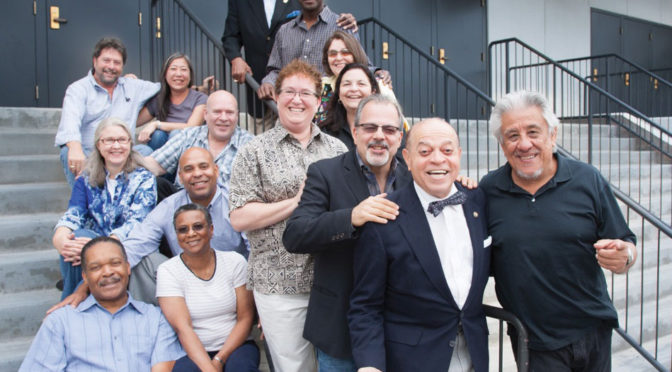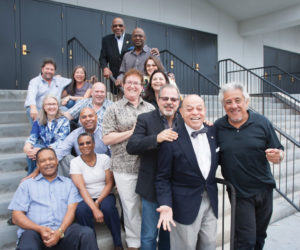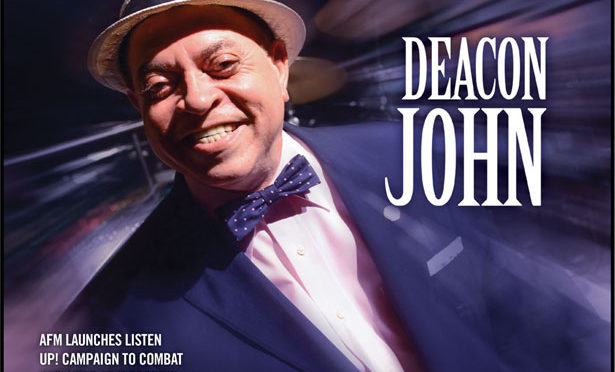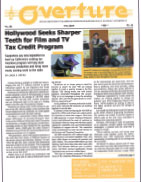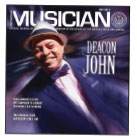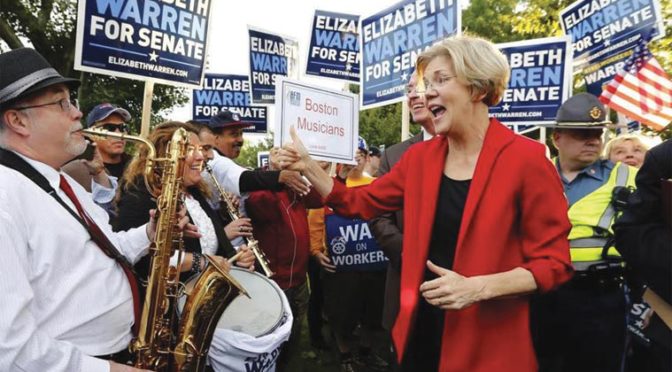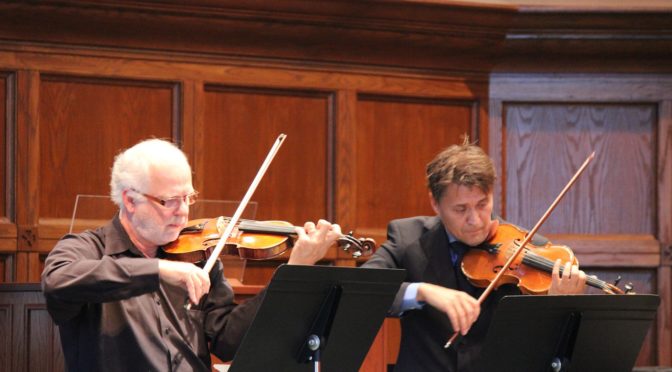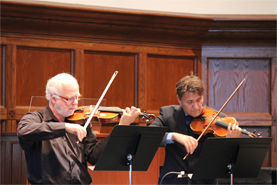by Laura Ross, ICSOM Secretary and member of Local 257 (Nashville, TN)
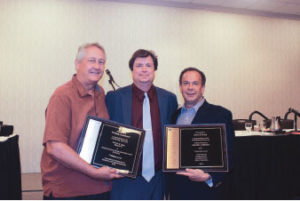
ICSOM Chair Bruce Ridge of Local 500 (Raleigh, NC), flanked by outgoing ICSOM Board officers Matt Comerford (left) of Local 10-208 (Chicago, IL) and Brian Rood of Local 34-627 (Kansas City, MO).
This year’s International Conference of Symphony and Opera Musicians (ICSOM) Conference, held August 26-29 at the Sonesta Philadelphia Hotel, celebrated advocacy and diversity, and provided labor law education and important negotiating and contract administration ideas and information. Local 77 (Philadelphia, PA) pulled out all the stops to partner with The Philadelphia Orchestra musicians. Delegates and guests toured the Kimmel Center and attended a lovely mixer on a patio overlooking the center and the Academy of Music. They were also treated to a double-deck bus tour of some Philadelphia landmarks and historical sites, including the Liberty Bell and the Art Institute, where they were given a chance to run up its 72 steps and pose by the statue of Rocky Balboa.
The ICSOM Governing Board, with the assistance of Philadelphia Orchestra cellist Gloria dePasquale, scheduled a volunteer service the afternoon before the conference officially began. ICSOM delegates, officers, and members partnered with Philadelphia Orchestra musicians to provide music, greeters, and servers at Broad Street Ministry, which is right across the street from the Kimmel Center. Housed in a beautiful old sanctuary, with artwork hanging from the rafters, this organization supplies hundreds of Philadelphia’s homeless with meals, clothing, and other necessities. Musicians from Atlanta, Chicago Lyric, Dallas, Fort Worth, Hawaii, Kansas City, the Kennedy Center, Los Angeles, Minnesota, Nashville, New Jersey, Philadelphia, Pittsburgh, and Utah orchestras performed and served during the dinner hour.
Wednesday morning, the conference began with stirring addresses by ICSOM Chair Bruce Ridge (North Carolina Symphony/Local 500) and ICSOM President Brian Rood (Kansas City Symphony/Local 34-627). Keynote speaker Dr. Jane Chu, the 11th and current chair of the National Endowment for the Arts, shared her history as the child of Chinese immigrant parents. Chu, who was born in Oklahoma, spoke about how music shaped her life and enabled her to honor different perspectives and ideas.
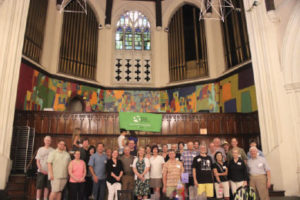
ICSOM volunteer musicians and Philadelphia Orchestra members performed and served at Broad Street Ministry, which serves Philadelphia’s homeless population.
Metropolitan Opera Orchestra trombonist Weston Sprott of Local 802 (New York City) spoke briefly about the importance of music education. He is featured in a new film, Some Kind of Spark. It documents the impact of Juilliard’s Music Advancement Program (MAP), which offers lessons to talented, inner-city kids. Media veteran Randy Whatley of Cypress Media Group returned for his third ICSOM Conference to discuss lessons learned during the past few years of lockouts and potential job actions.
Joe Conyers (The Philadelphia Orchestra assistant principal bass/Local 77) spoke about the formation of Project 440, an organization that trains young musicians to serve their communities through classical music. Allison Beck, director of the Federal Mediation and Conciliation Service (FMCS), spoke about changes at FMCS and negotiation and relation-building assistance. She served as mediator and FMCS advisor during both the Metropolitan Opera Orchestra negotiations and the Atlanta Symphony Orchestra’s lockout in 2014.
ICSOM Counsel Susan Martin led her third informative session of Delegate Duel, as four orchestra groups, along with AFM staff and local officers, competed to show off their understanding of labor law. AFM President Ray Hair’s presentation followed an explanation of the newly ratified Integrated Media Agreement (IMA).
Delegates learned about a documentary film and survey that update a 1987 ICSOM performance anxiety survey. They heard updates on the AFM & Employers’ Pension Fund. Leaders of the Regional Orchestra Players Association (ROPA), Organization of Canadian Symphony Musicians (OCSM), Theater Musicians Association (TMA), and Recording Musicians Association (RMA) spoke to delegates. Delegates were given the opportunity to submit questions for a moderated session with AFM Symphonic Services Division staff.
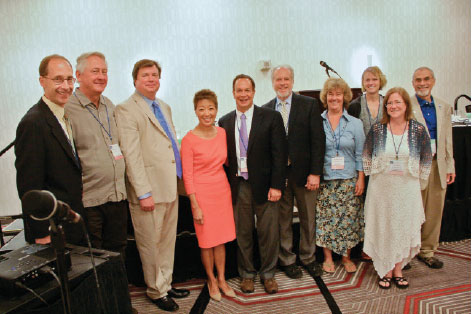
(Above) ICSOM Governing Board (L to R): Senza Sordino Editor Peter de Boor (Local 161-710/Kennedy Center Opera Orchestra); Member-at-large (MAL) Matt Comerford (Local 10-208/Chicago Lyric Opera Orchestra); Chair Bruce Ridge (Local 500/North Carolina Symphony); National Endowment for the Arts Chair Jane Chu; President Brian Rood (Local 34-627/Kansas City Symphony); Treasurer Michael Moore (Local 148-462/Atlanta Symphony Orchestra);
MAL Meredith Snow (Local 47/Los Angeles Philharmonic); MAL Jennifer Mondie (Local 161-710/National Symphony Orchestra); Secretary Laura Ross (Local 257/Nashville Symphony);
and MAL Paul Gunther, (Local 30-73/Minnesota Orchestra).
On the final day, attorneys Mel Schwarzwald and Joe Porcaro discussed bargaining presentations, information requests, and confidentiality agreements. Town meeting discussions included increased interest in finding solutions to protect musicians’ hearing from the excessive decibel levels that orchestras are dealing with as they perform more amplified pops and special concerts.
Delegates also dealt with bylaw changes and passed resolutions to honor outgoing ICSOM President Brian Rood, who stepped down at the end of the conference after serving 12 years as president, as well as Member-at-large and former ICSOM Electronic Media Chair Matt Comerford (Chicago Lyric Opera Orchestra/Local 10-208). They also acknowledged the contributions of former ICSOM webmaster Charles Noble (Oregon Symphony/Local 99), retiring governing board members Mary Plaine (Member-at-large, Baltimore Symphony Orchestra/Local 40-543), and Nancy Griffin (ICSOM Secretary, Seattle Symphony/Local 76-493). Delegates recognized conductors Robert Spano and Donald Runnicles, members of 148-462 (Atlanta, GA), for their support of musicians during last year’s Atlanta Symphony Orchestra lockout. Additional resolutions acknowledged OCSM’s 40th and TMA’s 20th anniversaries, and offered support for Hartford Symphony Orchestra musicians. Finally, resolutions thanked ICSOM Braumeister Robert Grossman (Philadelphia Orchestra/Local 77) for creating five different beers for the conference, and every member delegate signed on to urge Colorado Symphony musicians to remain in the AFM.
The 2016 ICSOM Conference will be held in Washington, DC.


